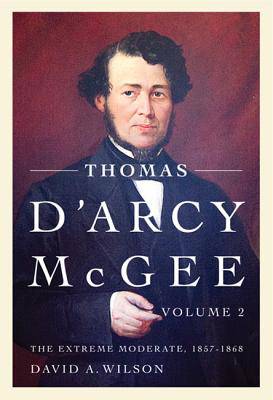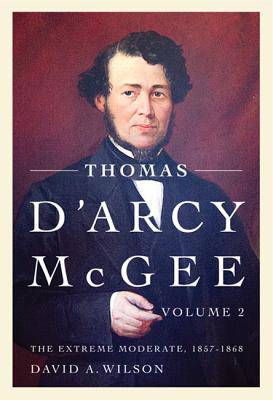
- Retrait gratuit dans votre magasin Club
- 7.000.000 titres dans notre catalogue
- Payer en toute sécurité
- Toujours un magasin près de chez vous
- Retrait gratuit dans votre magasin Club
- 7.000.0000 titres dans notre catalogue
- Payer en toute sécurité
- Toujours un magasin près de chez vous
48,45 €
+ 96 points
Description
After a tumultuous career as a revolutionary in Ireland and an ultra-conservative Catholic in the United States, Thomas D'Arcy McGee moved to Canada in 1857, where he became a force for moderation and the leading Irish Canadian politician in the country. Determined that Canada should avoid the ethno-religious strife that afflicted Ireland, he articulated an inclusive, broad-minded nationalism based on generosity of spirit, a willingness to compromise, and a reasonable balance between order and liberty. To realize his vision, McGee became a strong supporter of the "new northern nationality." A spellbinding orator who emerged as the youngest and most intellectually gifted of the Fathers of Confederation, he fought what he saw as the atavistic and intolerant elements of Canadian life - the Orange Order, with its strident anti-Catholicism; the opponents of separate schools, whom he viewed as enemies of minority rights; and above all the Fenian Brotherhood, with its dreams of revolutionizing Ireland and annexing Canada to the United States. Convinced that compromise with Fenianism was impossible, he set out to destroy the movement through a strategy of confrontation and polarization - channeling his earlier extreme tendencies in the service of moderation and attempting to reduce the influence of Fenianism within his own community. In the process, he alienated many of his former supporters, who came to regard him as a traitor who sacrificed the cause of Irish nationalism on the altar of personal ambition. On 7 April 1868, McGee was assassinated on the doorstep of his Ottawa boarding house. As someone who took an uncompromising stand against militants within his own ethno-religious community, and who attempted to balance core values with minority rights, McGee has become increasingly relevant in today's complex multicultural society.
Spécifications
Parties prenantes
- Auteur(s) :
- Editeur:
Contenu
- Nombre de pages :
- 528
- Langue:
- Anglais
Caractéristiques
- EAN:
- 9780773542969
- Date de parution :
- 08-07-13
- Format:
- Livre broché
- Format numérique:
- Trade paperback (VS)
- Dimensions :
- 155 mm x 234 mm
- Poids :
- 703 g

Les avis
Nous publions uniquement les avis qui respectent les conditions requises. Consultez nos conditions pour les avis.






